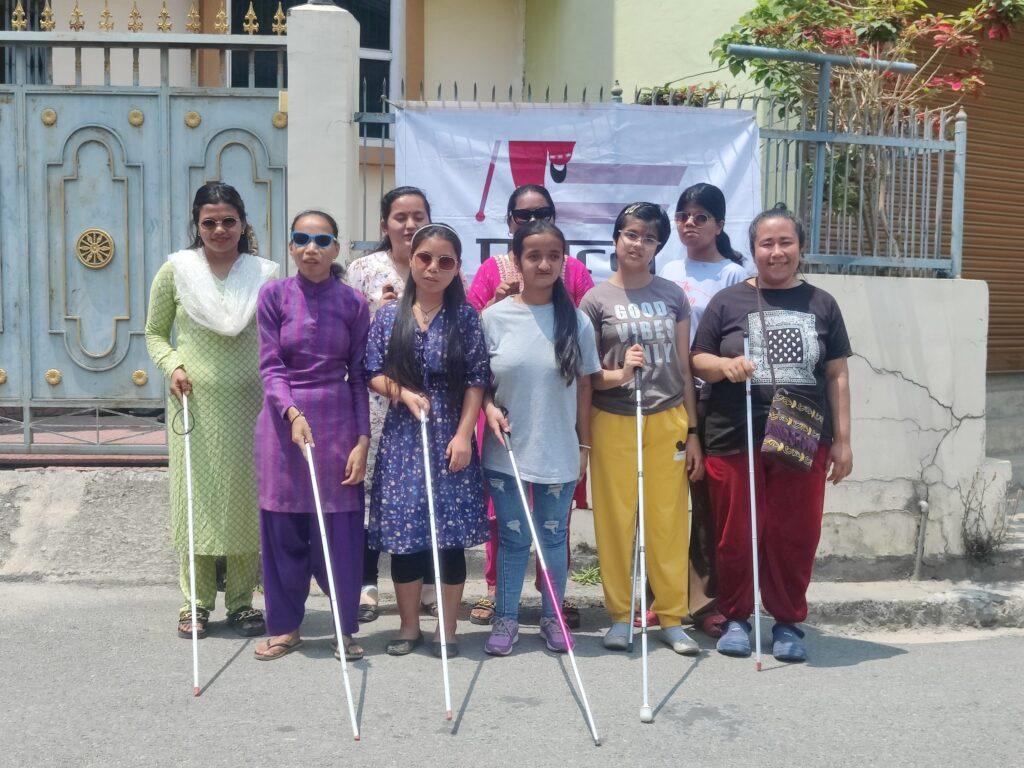
Prayatna Nepal is the self-help organization working for empowering the living condition women and girls with visually impairments. The organization is established by the composition of both women with and without visually impairments. Among the seven board members, five of them (71%) are with visually impairments where the organization is led by the totally blind woman as the Chairperson. This idea of inclusion in the organizational structure is to ensure equal efforts from every individual with better understanding in improving social, cultural, economic, and political aspects of lives of women with disabilities.
The Orientation and Mobility training is specific to support girls and women living with blindness through which they are oriented with safe, efficient, independent, and effective travel skills using white cane. The first day of the training was started by Ms. Sarita Lamichhane, chairperson of Prayatna Nepal. She highlighted the objectives of the training and introduced the lead facilitator, Mr. Rabindra Khanal. She also asked all the participants and organizing members present to introduce themselves by mentioning their names, disability, and individual expectations from the five-day training. After that, Mr. Rabindra proceeded with the theoretical part of the training. At first, he gave theoretical meaning and definition of the words such as “orientation” and “mobility”, which are interrelated in the field of blind and partially sighted people which means to walk or move with safely, independently, and scientifically. It is considered scientific as it involves basic techniques as per the need and environment. For instance, there are ten techniques that need to be considered while using white canes, that allows for safe and efficient walk using white canes. Mr. Rabindra also gave a general and thorough historical background of how, where, when and why Orientation and Mobility started. He mentioned about Johann Wilhelm Klein of Vienna, Austria who started the concept of training guide dogs. Similarly, he also mentioned the National white cane program started by Lion Club of Pretoria that lobbied for white cane law. He also asked the girls to be aware of their environment as it is one of the essential aspects of orientation that involves addressing questions such as, “where I am?”, “where am I going / where is the destination?” and “how can I find the destination?”. Similarly, mobility involves identifying and using correct ways, landmarks, clues to move from starting place to the destination in a safe, independent and scientific way.
The theoretical session was taken everyday usually in first hour of the training to review and revise the learning and then practical session was started. The practical session essentially involved practicing all the learnt and discussed methods and techniques while walking with the use if white canes. The facilitator along with assistant facilitator, Ms. Sabita Lamichhane and Prayatna Nepal team / volunteers helped to guide the participants in the practical session, during which the participants were brought in roads and open spaces. During this practice, the participants also learnt techniques for crossing streets, such as analyzing and identifying intersections and traffic patterns. They were also able to learn and use problem-solving skills to determine what to do if they are disoriented or lost or need to change their route. Additionally, the participants practiced and learnt methods of using white canes while walking up and down the stairs. They followed specific techniques of using white canes as per the situation and needs with the help of continuous guidance and follow-ups by facilitator and volunteers.
At the end of the five-days training, Ms. Ritu urged all the participants to share their experiences. She collected feedback from the participants and asked the participants to share what they liked and/or disliked in this training. All the participants agreed that this training is very crucial for all individuals with visual impairments and that they are grateful to Prayatna Nepal for providing them with this learning opportunity. She also asked Mr. Rabindra to share his experiences, where he also added words of encouragement to motivate participants to keep up the continuous practice of the learnt skills and techniques. After that, Ms. Ritu concluded the five-days training by requesting Mr. Rabindra to distribute white canes to individual participant on behalf of Prayatna Nepal.


